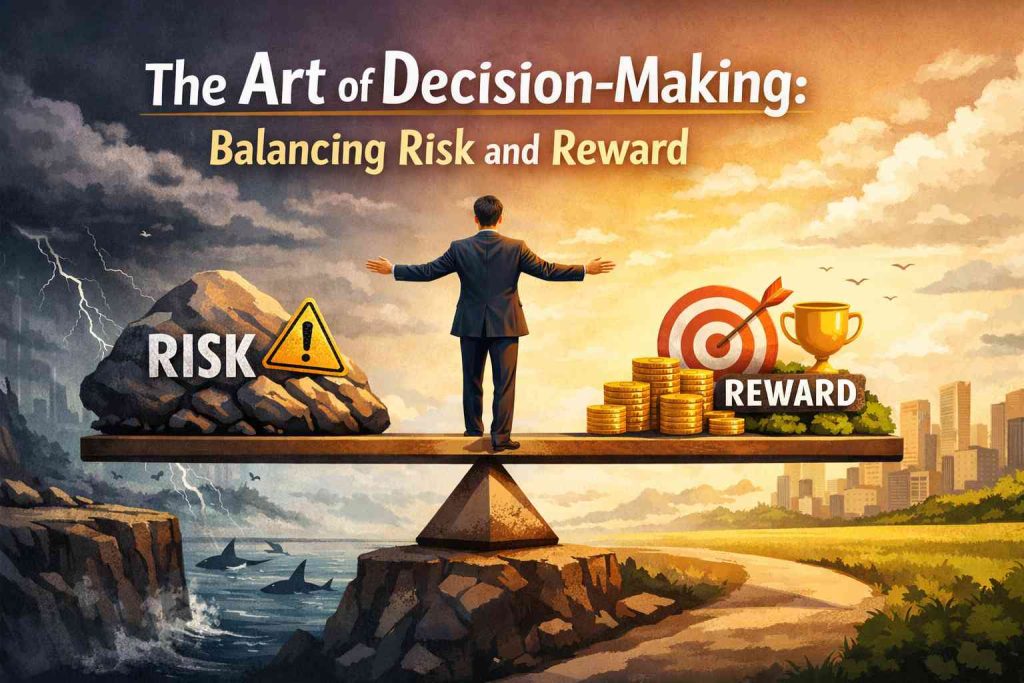
We utilize our ability to make decisions on a daily basis, from outfit selection to significant life decisions. It’s about balancing the benefits and drawbacks, risks and returns. Making wise decisions requires an understanding of this balance, particularly under difficult circumstances. This article examines how humans make decisions, the value of comprehending risk and reward, and how this information may help us make better judgments in a variety of spheres of life, including gambling and banking.
The Psychology of Choice
Why do we choose one thing over another? Our decision-making process is shaped by:
- Emotional influence: How we feel can significantly sway our choices.
- Past experiences: Previous outcomes can guide future decisions.
- Social factors: Peer pressure and societal norms can impact what we decide.
- Risk assessment: We constantly weigh potential gains against possible losses, consciously or not. A prime example is gambling. It shows how we evaluate chances and decide whether the potential reward is worth the risk.
Financial Decisions: Investments and Gambling
In the world of finance, decision-making is crucial. Comparing investments and gambling highlights how we balance risk and reward:
Investments
- Long-term focus: We look for stability and growth over time.
- Research-based: Decisions are often backed by thorough analysis.
- Calculated risk: The aim is to minimize potential losses while maximizing gains.
Gambling
- Short-term outcome: Immediate wins or losses.
- Chance-based: Less control over the outcome compared to investments.
- High risk, high reward: The allure is in the possibility of a big win.
In the context of financial decision-making, it’s crucial to strike a balance between these factors to make informed choices that align with our goals and preferences. https://piratespot.com/en/livecasino/ with its focus on gaming and entertainment, can offer valuable insights into this dynamic interplay between risk and reward in decision-making, making it a fitting addition to our discussion.
Risk Management in Business
Success in the business sector depends on effective risk management. Businesses must manage risks in order to make strategic decisions since they must deal with a variety of obstacles and uncertainties. Businesses, like gamblers, evaluate odds and stakes by using a systematic approach to risk assessment and mitigation. This is how companies manage risk:
- Assessment: Identifying potential risks in the market or within the company.
- Analysis: Evaluating the impact and likelihood of these risks.
- Strategies: Developing plans to address risks, including avoidance, reduction, or acceptance.
- Implementation: Putting these strategies into action.
- Monitoring: Continuously reviewing the effectiveness of risk management strategies.
Think of high-stakes business decisions as a game of poker. Just like in poker, businesses must read the market, anticipate competitors’ moves, and sometimes take bold risks for high rewards.
The Role of Probability and Statistics
Probability and statistics are the backbone of effective decision-making. They help us understand and quantify the likelihood of various outcomes, crucial in both business and gambling. Here’s why they are important:
- Predicting Outcomes: These tools help in forecasting future events based on historical data.
- Risk Assessment: Probability and statistics enable a better understanding of the risks involved in different decisions.
- Informed Decisions: By analyzing data, decision-makers can choose options with the best odds of success.
In gambling, for instance, understanding the probabilities helps gamblers make more informed bets. Similarly, in business, these concepts help leaders make decisions that are grounded in data rather than just intuition or guesswork.
Decision-Making in Everyday Life
Every day, we face decisions that shape our lives. From choosing a career to navigating personal relationships, each decision comes with its own set of uncertainties and risks. Think of it like gambling – every choice is a bet on a potential future. Here’s how this applies to daily life:
- Career Choices: Deciding on a job or career path involves evaluating potential benefits and the risk of job security or satisfaction.
- Personal Relationships: Choosing to trust or commit in a relationship is akin to betting on the potential for a positive, fulfilling connection.
- Health and Lifestyle: Daily choices about diet, exercise, and habits are bets on long-term health outcomes.
These decisions mirror the uncertainty and risk calculation inherent in gambling, where every choice can lead to different outcomes.
Learning from Mistakes: The Gambler’s Fallacy
One common pitfall in decision-making is the gambler’s fallacy – the belief that past events can influence future outcomes in independent events. Here’s how understanding this fallacy is vital:
- Recognizing Bias: The gambler’s fallacy is a reminder to avoid letting past outcomes unduly influence current decisions.
- Gambling as a Case Study: In gambling, this fallacy often leads to the mistaken belief that a string of losses or wins predicts future outcomes.
- Application in Everyday Decisions: This insight helps us avoid similar mistakes in everyday choices, whether it’s in financial decisions, relationships, or career moves.
Understanding and avoiding cognitive biases like the gambler’s fallacy can lead to more rational and effective decision-making.
Mastering Risk and Reward
Throughout this exploration of decision-making, it’s clear that understanding risk and reward is crucial, whether in business, gambling, or daily life. The parallels with gambling offer a unique perspective on how we weigh options and make choices. Here are the key takeaways:
- Sound Decision-Making: This involves careful assessment of risks and potential rewards, much like a calculated bet.
- Learning from Gambling: Concepts from gambling, such as probability and the gambler’s fallacy, provide valuable insights into making better, more informed choices.
- Applying these Insights: By recognizing these principles in our everyday decisions, we can navigate life’s uncertainties with greater confidence and success.
Remember, life is full of gambles, and understanding how to play the odds can make all the difference.
